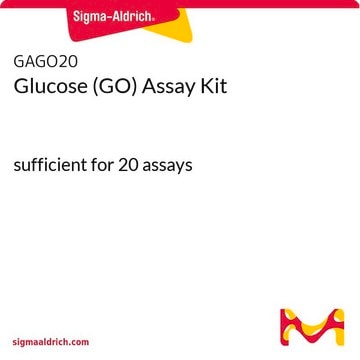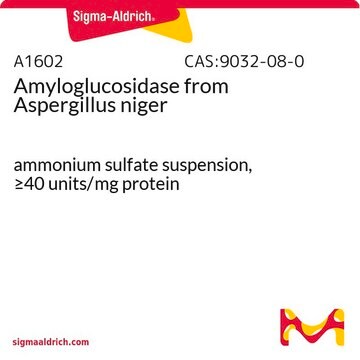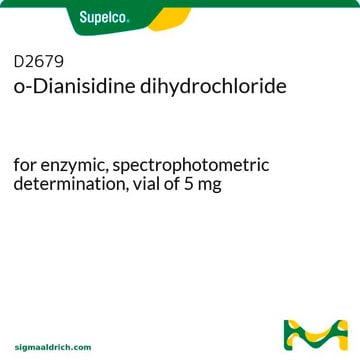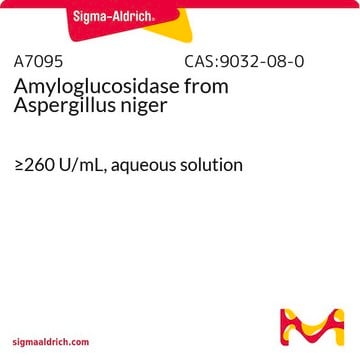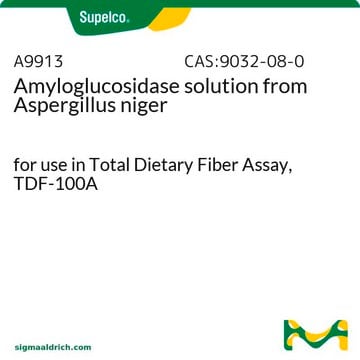P7119
PGO Enzyme Preparation
1 G capsules
Synonym(s):
Peroxidase - Glucose oxidase preparation
Sign Into View Organizational & Contract Pricing
All Photos(1)
About This Item
UNSPSC Code:
12352204
NACRES:
NA.54
Recommended Products
form
powder
solubility
H2O: soluble capsule/100 mL at 25 °C, clear, colorless (pH 6.95-7.05)
storage temp.
2-8°C
General description
Each capsule contains 500 units of glucose oxidase (Aspergilus niger), 100 purpurogallin units of peroxidase (horseradish), and buffer salts. The reaction produces oxidized o-Dianisidine, which is brown. The intensity of the brown color measured at 425-475 nm is proportional to the original glucose concentration.
Application
PGO Enzymes preparation has been used:
- in diet sampling and chemical analyses
- to determine plasma and follicular fluid glucose levels
- to measure glucose content in fractions of retrograded debranched rice starch
Biochem/physiol Actions
PGO Enzymes are used for the quantitative, enzymatic determination of glucose in aqueous solutions such as serum. The reactions are normally monitored at 425-475 nm utilizing o-dianisidine as a colorimetric substrate. Glucose oxidase methods eliminate the effects of interfering substances. Contents of one capsule includes 100 units peroxidase and 500 units glucose oxidase and buffer salts.
Suitability
Tested and found suitable for use in the quantitation of glucose.
Preparation Note
The PGO enzymes solution is prepared by adding the contents of 1 capsule of PGO enzymes to 100 mL of water in an amber bottle. Bottle should be inverted several times with gentle shaking to dissolve. PGO Enzymes solution should be stored at 2-8 °C. The solution is stable for up to 1 month unless turbidity develops, and for at least 6 months at –20 °C.
Signal Word
Danger
Hazard Statements
Precautionary Statements
Hazard Classifications
Resp. Sens. 1
Storage Class Code
13 - Non Combustible Solids
WGK
WGK 1
Flash Point(F)
Not applicable
Flash Point(C)
Not applicable
Personal Protective Equipment
dust mask type N95 (US), Eyeshields, Gloves
Certificates of Analysis (COA)
Search for Certificates of Analysis (COA) by entering the products Lot/Batch Number. Lot and Batch Numbers can be found on a product’s label following the words ‘Lot’ or ‘Batch’.
Already Own This Product?
Find documentation for the products that you have recently purchased in the Document Library.
Customers Also Viewed
Joel I Jokinen et al.
Plants (Basel, Switzerland), 8(6) (2019-06-05)
Infection by holoparasitic plants typically causes decreases in host mass, thought to be primarily as a result of resource abstraction. Inverse relationships have been noted between the number of Orobanche spp. parasites infecting a host and their mass, suggesting that
R Salehi et al.
Journal of dairy science, 99(5), 3584-3597 (2016-03-14)
The objectives were to determine the effects of supplemental fat (no oilseed vs. oilseed) during late gestation and the source of fat (canola vs. sunflower seed), on dry matter intake (DMI), plasma metabolite concentrations, milk production and composition, calf birth
P Piantoni et al.
Journal of dairy science, 98(5), 3323-3334 (2015-03-03)
Forty-eight multiparous cows were used in a randomized complete block design experiment with a 2×2 factorial arrangement of treatments to determine the interaction between a highly saturated free FA supplement (SFFA) and dietary forage NDF (fNDF) content on energy balance
W Z Yang et al.
Journal of animal science, 90(4), 1301-1310 (2011-11-22)
A study was conducted to evaluate feed intake, ADG, carcass quality, eating behavior, and blood metabolites in feedlot beef steers fed diets that varied in proportion of wheat dried distillers grains with solubles (DDGS) replacing barley grain or barley silage.
Evaluation of triticale dried distillers grains with solubles as a substitute for barley grain and barley silage in feedlot finishing diets
K. T. Wierenga, T. A. McAllister, et al.
Journal of Animal Science, 88, 2018-3029 (2010)
Our team of scientists has experience in all areas of research including Life Science, Material Science, Chemical Synthesis, Chromatography, Analytical and many others.
Contact Technical Service
